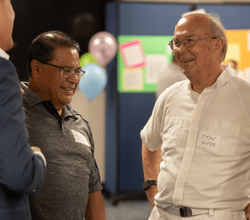
Every morning, Fr. Stan Sledz makes a pot of coffee to go with his morning Liturgy of the Hours prayer.
Before he begins reciting the Psalms, he reads through “the list.” It has hundreds of names on it.
When a criminal he’d met at a local corrections facility would tell Fr. Sledz his or her name, he’d add it to the list. When he met an African-American through his ministry providing grants to minority Catholics working in parishes, he or she would go on the list, too. When he’d meet a Native American interested in the Catholic faith, Fr. Sledz would write his or her name down as soon as he was able.
He prays for them all every morning as he opens his breviary. Some of them are even his godchildren.
“It goes on for about 15 minutes,” Sledz said.
Sledz, a 2022 Saint Paul Seminary Distinguished Alumni Award recipient, has spent more than five decades bringing Christ to those considered to be on the margins of society. The Saint Paul Seminary alumnus ministered to prisoners at both the Hennepin County and Ramsey County correction centers for over 20 years.
In 1995, he helped found New City Ministry, which provides annual grants to Catholics from minority communities who are involved in faith formation at their parishes. A native of northeast Minneapolis, Sledz served at traditionally African American parish St. Peter Claver in St. Paul from 1982-1990 and is currently the sacramental minister at Gichitwaa Kateri, a predominantly Native American church in Minneapolis.
Sledz has come back to The Saint Paul Seminary multiple times to share his perspective as part of the seminary’s cultural empathy seminars. His work has touched thousands of Catholics in the Saint Paul and Minneapolis Archdiocese — from various backgrounds, races and cultures.
“Each year was very fulfilling,” Sledz said. “I accept the award as an expression of prayer and thanksgiving.”
The grandson of Polish immigrants, Sledz grew up in Northeast Minneapolis. Two of his uncles were also priests, and Sledz credits them for introducing him to the possibility of the priesthood. After graduating from DeLaSalle High School, he attended college seminary at Nazareth Hall then spent six years at The Saint Paul Seminary.
Ordained in 1969, Sledz points to an experience during his time in seminary as a key moment of his presbyteral career.
Sledz had the opportunity to make visits to Boys Totem Town, a Ramsey County juvenile correction facility in St. Paul that closed in 2019.
“I’d have good discussions with inmates, and we’d build good rapport,” Sledz said. “That’s when I realized priests did that sort of thing. … Once I had a taste of that, I knew I wanted to be in corrections, for sure.”
After one of his last visits, a young inmate told him, “don’t forget us.”
“It brought tears to my eyes and still does,” Sledz said. “I pray for them every day.”
Working at St. Peter Claver gave Sledz, who is white, a new appreciation for the Black Catholic community, as well. After inheriting $200,00o in 1991, he wanted to help minority Catholics with a heart for service in the Church.
More than 426 grants totaling $237,323 have been awarded to Catholic leaders in 24 parishes, all but one in the Archdiocese of St. Paul and Minneapolis.
Sledz has had a similar impact on the Catholic Native American community in the Twin Cities. While he’s semi-retired, his presence at Kateri has helped countless Ogibwe and Lakota people infuse their cultural heritage with Catholicism.
“It’s always been a mutual blessing,” Sledz said of working with Catholics from different cultures. “Their spirituality isn’t something I brought. It’s something I experienced and benefited from. It’s a blessing to me.”
What can the average Catholic do to better understand and engage fellow believers who come very different backgrounds than their own, as Sledz has?
“Quite simply, listen to to the Gospel,” Sledz says. “There is that powerful piece that says ‘when I was hungry you fed me; when I was a stranger, you welcomed me.'”

